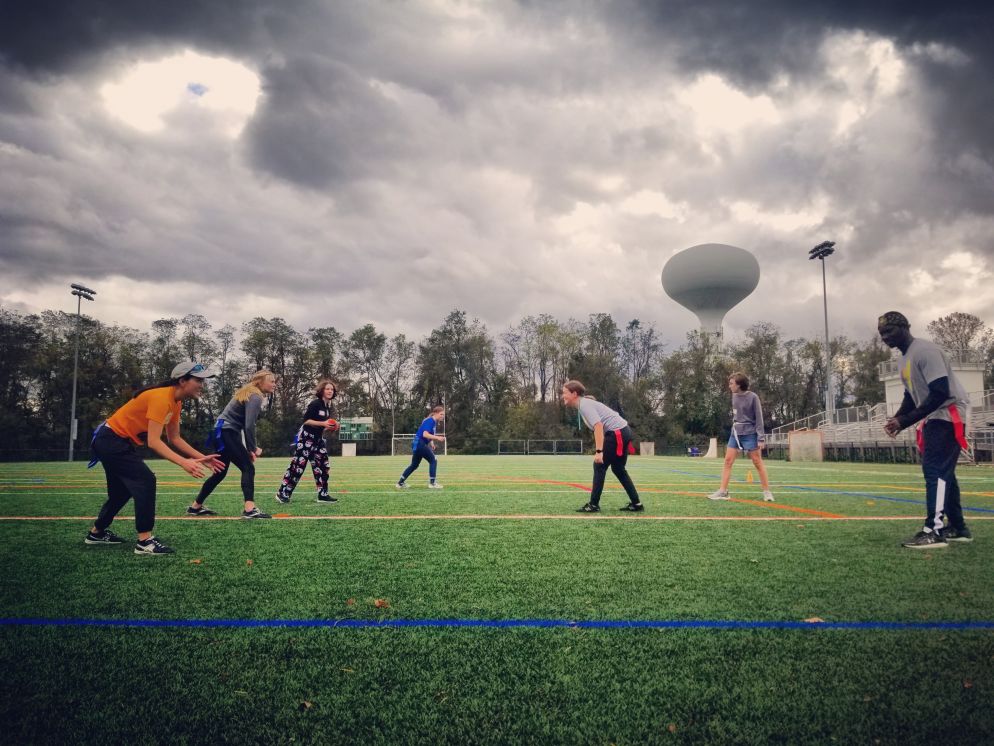
Sports are a great way for kids to stay active, develop their social circle and gain confidence. That can be especially important for kids and teens in minority groups who might not always meet peers who share their identities during school.
Programs such as the Special Olympics are unique in that they allow kids who have developmental — and in some cases physical — disabilities to socialize together.
“It takes kids with different abilities, kids like Lili, a long time to learn what society perceives as normal,” says Diany McLuckie, whose 7-year-old daughter has Down syndrome.
McLuckie is head coach of the Special Olympics Young Athletes Program in Frederick. Since her daughter became involved in athletic programs at 14 months old, McLuckie has seen gymnastics change Lili’s life.
Sports benefited Lili’s social skills, listening skills, patience, play and learning skills. They gave her an environment where she was able to show her outgoing and friendly personality, even though she communicates differently.
“As a community, I think we need to be more patient with all kids — understand that they’re kids.”
Having a peer group is important for all kids because it helps them develop relevant problem-solving strategies, improves social and emotional skills, provides companionship and reduces stress. When kids are not forming peer groups, sometimes they need someone to intentionally create an inclusive space.
Intentional Safe Spaces
That’s why Olanrele Oni founded Unmatched Athlete, a Maryland-based non-profit that works to encourage LGBTQ+ youth and allies ages 5 to 18 to participate in sports and fitness activities, with his husband, Justin Fair.
“I’ve always loved sports. It’s always been something dear to me — I’m competitive,” says Oni, who noted the couple founded the nonprofit in 2020, which was “a really interesting year for a lot of reasons. It was the height of the pandemic, a lot of uprising in the country, the Black Lives Matter movement, the Black Trans Lives movement.”
“When you grow up queer, you know you’re different. You may not know what to call it or how to describe it, but it played a role in my feeling like I couldn’t bond or build a sense of community because what if they found out?” Fair adds.
Unmatched Athlete organizes weekend pickup games for youth to play, have fun and build community. Oni and Fair eventually plan to feature leagues, tournaments and after-school fitness along with social outings like field trips.
Fair, Unmatched Athlete’s vice president, says that as their organization continues to grow so does the need for it.
“When we look at what’s going on in the country, at specific laws that have been passed specifically in relation to trans youth, it’s more important now than ever to let parents know that there is a safe place for their child in sports,” he says.
Currently, the American Civil Liberties Union is tracking 399 anti-LGBTQ bills in the United States. Many of these bills are applied to a pastime kids have long shared and enjoyed together: sports.
The effects of intentional inclusion are already being felt and recognized according to Oni and Fair, who say their children are able to be around other children like them for the first time.
“It’s really powerful. It shows something that’s been lacking. I truly believe that we will change sports, because it’s about time we do it,” Fair says.
Good for Mental Health
Sports are an opportunity to build a family and social network, which many young people in the LGBTQ community feel excluded from. According to an article published with the National Library of Medicine, LGBT youth are at an elevated risk for poor mental and physical health compared to heterosexual and cisgender (not transgender) peers.
And mental health among children with disabilities can also be at risk. According to United Disability Services, some of the factors that negatively impact the mental health of people with disabilities include negative stereotyping, physical barriers and reduced access to their communities. Programs like the Special Olympics provide a safe haven from bullying for children with disabilities.
One way to help encourage understanding and acceptance is through Special Olympics unified teams like the one at Woodgrove High School in Purcellville, Virginia—where players with and without disabilities are on the same team.
The unified program at Woodgrove has quadrupled in size since it started with a handful of students last fall. For Coach Ben Bates—a 17-year special education teacher and 35-season coach—it isn’t all about winning, it’s about building lifelong connections between students of all abilities.
“It’s been successful in bridging those gaps,” Bates says, “Seeing the athletes and their partners high-five in the halls…before unified that wouldn’t have happened.”
The best part of both coaching and teaching is seeing the kids’ progress and knowing you made a difference, he says.
Since the first International Special Olympics Summer Games was held in 1968, the need for inclusive programs has only increased, but now, more than ever, these programs need volunteers to help make sure children have access to sports.
Volunteer at specialolympicsva.org/potomac-region/area-14 and unmatchedathlete.org. Track bills through the ACLU at aclu.org/legislative-attacks-on-lgbtq-rights







